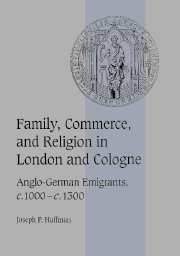Book contents
- Frontmatter
- Contents
- Preface
- List of abbreviations
- The wards of medieval London
- The parishes and districts of medieval Cologne
- Anglo-Cologne family genealogies
- Introduction
- Part I The historical background: Anglo-German commercial foundations and the city of Cologne
- Part II Anglo-Cologne family, property, and inheritance ties
- Part III Anglo-German religious and cultural life
- Conclusion: A reappraisal of the Anglo-German nexus
- Appendix: The archbishops of Cologne
- Select Bibliography
- Index
- Cambridge Studies in Medieval Life and Thought Fourth series
Conclusion: A reappraisal of the Anglo-German nexus
Published online by Cambridge University Press: 02 November 2009
- Frontmatter
- Contents
- Preface
- List of abbreviations
- The wards of medieval London
- The parishes and districts of medieval Cologne
- Anglo-Cologne family genealogies
- Introduction
- Part I The historical background: Anglo-German commercial foundations and the city of Cologne
- Part II Anglo-Cologne family, property, and inheritance ties
- Part III Anglo-German religious and cultural life
- Conclusion: A reappraisal of the Anglo-German nexus
- Appendix: The archbishops of Cologne
- Select Bibliography
- Index
- Cambridge Studies in Medieval Life and Thought Fourth series
Summary
Anglo-German relations during the Central Middle Ages were certainly not a peripheral element in western European history, although most modern accounts of this era have neglected to integrate this dimension into the more traditional preoccupation with Anglo-French and German-Italian interactions. This study is an attempt to achieve such an integration and to illuminate in particular the centrality of Cologne in this important yet underemphasized interregional connection. The apparent lack of fruit borne from medieval diplomatic relations between England and Germany has negatively shaped modern assessments of Anglo-German relations in general; but these frustrated diplomatic initiatives should be understood rather as evidence of the actual realities and limitations of medieval politics than as a failure to achieve modern geo-political goals. Indeed the absence of lasting political consequences does not invalidate our thesis, because extensive and crucial negotiations did in fact transpire and these activities were a result of more productive, interregional relations in the areas of economic, social, religious, and cultural contacts. The political importance of Cologne and its archbishops for England during the Central Middle Ages could never have existed in isolation from these other historical dimensions. Therefore, just as it always behoves the seafarer to anticipate a larger mass beneath the waters when the tip of an iceberg is sighted, we have looked for further evidence of interregional contacts and were not disappointed.
- Type
- Chapter
- Information
- Family, Commerce, and Religion in London and CologneAnglo-German Emigrants, c.1000–c.1300, pp. 240 - 242Publisher: Cambridge University PressPrint publication year: 1998



